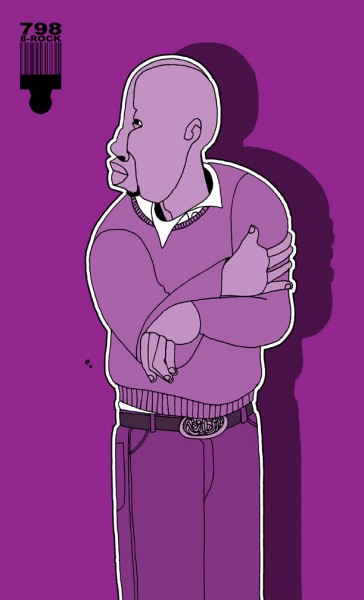
I liked this guy. He was the only person in Trader Joe’s without a grocery cart or hand basket. He’d folded his arms like he was cold; or maybe he was just a little freaked out by the number of people in the store and the length of the lines at check out. I think he was waiting for someone else to finish shopping.
In terms of his outfit, this guy was doing a neat sort of dress casual thing, with a pair of fancy dark denim jeans, a cashmere sweater, and a Montana Silversmiths belt buckle (don’t ask me how I know that). It thought he might work in sports or television or some other field in which style and prestige are important but suits are not required. Clean shaven of head and face–except for a little line of a goatee–he didn’t really have a baby face, but his look was unquestionably boyish. He looked like the kind of guy who would be friendly and good-humored. He might have been the class clown back in high school or the beer captain of his college rugby team.
In short, he looked like the kind of guy I’d enjoy getting to know. In a different context, though, a police officer would probably think he looked dangerous or predatory or homicidal. Because he is a man and he is Black, the subject of this drawing probably seems frightening to many, simply because of his skin and his hair and his attitude.
In the wake of the Ferguson protests or the subsequent #BlackLivesMatter protests on television, many Americans of all races have come to believe that the fear of Black men simply because they are Black is irrational.
But irrational fears are phobias; and don’t most phobias have labels and diagnostic criteria? If the fear of Black men was truly believed to be irrational, pathological, and unfounded, wouldn’t it be identified as an illness?
But it isn’t, and individual voices throughout our society fall all over themselves to justify the fear of men of African descent as not only acceptable, but necessary. Make no mistake: the fear of Black men is an illness; and yet the power to define what is normal and healthy, on the one hand, and what is pathological, on the other, belongs to the group(s) in power. There is nothing empirical and little that is scientific about the designation of some behaviors or attitudes as irrational and others as reasonable. Until our understanding of what is reasonable is no longer defined as all behaviors that are in the best interest of the majority, those whose existence (and resistance) makes the majority feel uncomfortable will have no recourse against the fear and hatred that so many Americans feel toward them.
Ajuan Mance